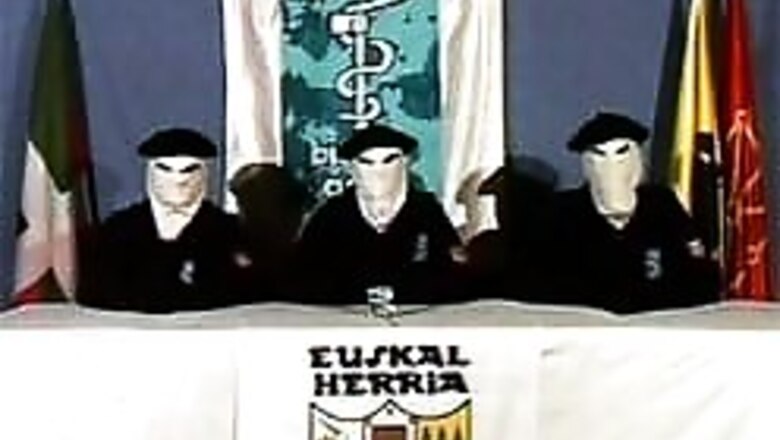
views
San Sebastian: A cease-fire that ends nearly four decades of violence by the armed Basque separatist group ETA came into force on Friday just after the stroke of midnight, ushering in a new era of hope for Spain after decades of bombings and assassinations.
Though ETA has called truces before, this is the first to include "permanent" in the wording.
Streets around Spain were quiet, with no celebrations reported, despite the historic nature of the cessation of violence that began right after midnight.
"It is possible to overcome the conflict, here and now," ETA said on Thursday in the second of two communiques explaining its desire to use negotiations to end nearly 40 years of strife that have claimed more than 800 lives.
"It is time to make important decisions, moving from words to deeds," ETA said in a statement handed out to Basque newspaper Gara.
The group urged the French and Spanish governments not to thwart the groundbreaking process launched by its decision to lay down arms after nearly four decades of bombings and shootings that have claimed more than 800 lives and made ETA one of Europe's last armed militant groups.
Meanwhile the Spanish attorney general's official said it wants prosecutors to seek the jailing of a Basque separatist leader, backtracking amid criticism for suggesting judges perhaps go easy on him now that ETA has declared a cease-fire.
Attorney General Attorney General Candido Conde-Pumpido had said last week he wanted prosecutors to seek the jailing of Basque separatist leader Arnaldo Otegi on grounds he violated bail terms in an ETA-related case by allegedly inciting violence in a strike in the Basque region on March 9.
After ETA declared the cease-fire on Wednesday, the attorney general infuriated the conservative opposition and even raised eyebrows among the government by saying judges considering the cases of Basque politicians like Otegi should evaluate "the new circumstances" raised by the truce when deciding whether to jail them.
But on Thursday, Conde-Pumpido met with the chief prosecutor at the National Court in Madrid and maintained his original instructions on Otegi, who is to appear in court next Wednesday.
Otegi, leader of the banned Batasuna party, is the most prominent and visible member of the Basque pro-independence movement and considered a key figure for possible peace talks between the government and ETA.
PAGE_BREAK
Batasuna members have said a peace process would not be hindered even if he is jailed, but such a move would certainly anger Basque nationalists and at least complicate things.
Much of Thursday's communique repeated wording contained in ETA's first statement announcing the permanent cease-fire, a first for a group that has called truces before, only to revert to violence after peace talks failed.
This time, ETA is seen as seriously weakened by wave after wave of arrests in recent years and stymied by the Islamic terror bombings of March 11, 2004 in Madrid, which killed 191 people and wounded more than 1,500 and made further ETA killing politically unthinkable.
ETA has not staged a fatal attack since May 2003.
Thursday's document mentioned for the first time "dialogue and negotiation" with the governments of Spain and France.
France is included because ETA has traditionally said three regions of southwest France should be part of the independent Basque homeland it has been fighting to create.
"ETA calls on the authorities of Spain and France to respond in a positive way to the new situation and not place obstacles in the way of the democratic process," the statement said.
It did not say what issues should be negotiated.
But as speculation rose in recent months that ETA was close to declaring a cease-fire, despite a persistent wave of relatively small, non-lethal bombings, the issue of the more than 800 ETA prisoners in Spanish jails emerged as one of the topics Prime Minister Jose Luis Rodriguez Zapatero would have to deal with.
ETA and its supporters have long demanded that ETA prisoners -- intentionally spread around the country, sometimes in far-flung jails in the Canary Islands or Spanish enclaves in north Africa -- be moved to the Basque region itself so they can be closer to their families.
ETA's weapons arsenals would also have to be dealt with.
Zapatero, who offered ETA peace talks last May if it renounced violence, has repeatedly said he would make no concessions to ETA and simply negotiate terms for its surrender.
He said after Wednesday's cease-fire announcement that he has not yet decided if this statement fulfills his conditions for engaging in peace talks.




















Comments
0 comment